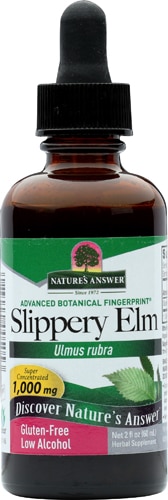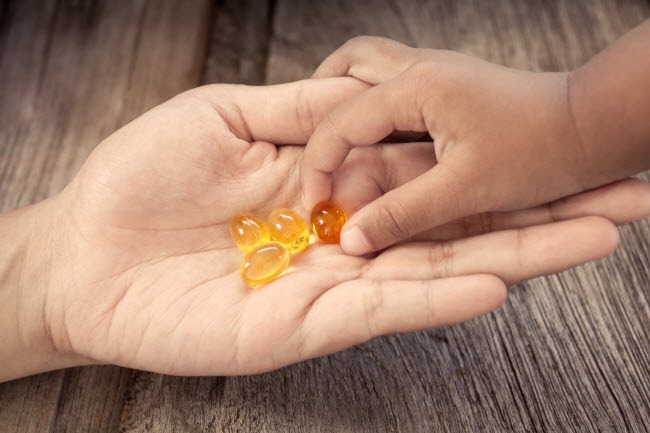Taking a holistic approach to life tends to be a whole-family aim. Together, you eat right, exercise often, prioritize play, emphasize connection, sleep well, and cope smartly with stress. That part is a no-brainer.
But whether or not to give your children herbal supplements is less of an absolute. Do they need supplements this early in life? How can herbs help them? And, most importantly, are they safe?
It depends. Some herbs are best suited for health concerns that creep up with age—black cohosh for menopause, for example, or ginkgo biloba for brain health. Others still should be completely avoided by children. But a number of items from nature’s medicine chest can also be valuable for children. While it’s crucial to consult with your pediatrician first, here are my top picks of herbs for kids—and what they should stay away from:
Go With: Elderberry
Your child’s immune system is still being carefully crafted, rendering them prone to picking up colds on the playground. Your solution? Elderberry. Not only does this sweet stuff go down easy with even the finickiest kid, it also supports healthy immunity. This is thanks in part to elderberry’s inclusion of anthocyanidins, a flavonoid that helps promote wellness. Serve it to your child in a yummy, berry-flavored elderberry syrup.†
Stay Away From: Bitter Melon
This medicinal fruit, native to Asia and a cornerstone of Ayurvedic medicine, may support iver and digestive health in adults, but it can be toxic for children.
Go With: Slippery Elm Bark
Slippery elm bark can be just as useful for symptoms of the common cold. As an herbal extract, it dissolves in your child’s mouth and provides a gel-like coating to alleviate painful swallowing and a scratchy throat. It can also be mixed in water to soothe mild tummy discomfort and heartburn.†
Stay Away From: Licorice
It may be the first “herb” your child requests, but medicinal licorice may cause a litany of potential problems for your wee one: According to The Honest Herbal by Varro Tyler, large doses of licorice root have been associated with fatigue, headaches, potassium loss, even heart problems. Note that small doses are safe for children.
Go With: Chamomile
As one of the most venerated herbs around the world, chamomile is one of the surest natural ways to soothe yourself—and your child. The NIH demonstrates that chamomile can ease anxiety—an enormous plus for restless, hyper, or worried children. Indeed, chamomile for children is a staple in Central and South America, where it’s given to children with colic, sleeplessness and teething. What’s more, chamomile organically supports digestion and heart health. Serve it as chamomile tea with a splash of honey (but be sure that your child isn’t allergic to ragweed beforehand).†
Stay Away From: Valerian
This European perennial has gained acclaim for its sleep-stimulating powers. But save it for the adults in your household: It’s too potent of a sedative for children.
Go With: Ginger
Your mother gave you ginger ale; you, as a modern mother or father, give your child ginger tea. Deemed an antispasmodic, ginger can help soothe muscle contractions associated with indigestion or the flu, giving your little one massive relief. Just ensure that you’re giving your child tea made with freshly-grated ginger and not that ale you cherished as a child: The sweet, carbonated stuff contains only a very small amount of actual ginger.
Stay Away From: Peppermint
We may dole out candy canes to children at Christmastime, but peppermint oil and capsules can increase acid reflux in a child and exacerbate their tummy troubles. Peppermint spray, however, may be used to relieve a sore throat.
Go With: Aloe Vera
This prickly plant isn’t just a life-saver for adult skin that has been out in the sun too long: Not only can it soothe sun-scorched skin on children as well, but it can also aid in the recovery of wounds by helping to bring fresh, oxygenated blood to the small vessels that fuel skin. Indeed, in a study published in Burns, aloe vera decreased healing time by nearly nine days. Find it in a gel or pluck it from your garden.†
Stay Away From: Kava
Kava has demonstrated potential to reduce anxiety and encourage sleep but it may also present liver problems when given to children.
Go With: Echinacea
Echinacea commonly leads the pack as the most popular herb around. For good cause, too: The North American coneflower brims with polysaccharides, flavonoids,and vitamin C, all of which can organically encourage a more robust and resilient immune system. In fact, the Annals of Internal Medicine determined that echinacea can reduce the severity of cold symptoms. Available in chewables, echinacea drops and syrups, it can be a tasty way to help your child keep a cold at bay—or recover from it asap.†
Stay Away From: St. John’s Wort
While St. John’s Wort has earned acclaimed for naturally encouraging a brighter mood, it has not been sufficiently tested on children. What reports have come in have demonstrated that it may cause kids to feel nauseous, dizzy, sleepy and/or confused; it may also interact with prescription medications.
Go With: Calendula
As one of the loveliest and most versatile herbs, calendula—which you might know as pot marigold—is a sight to behold, a culinary treat, and a boon for your body. A common ingredient in hair and skin care, its flavonoids and plant-based antioxidants organically support everything from acne-free skin to an ache-less tummy. What’s more, calendula is gentle enough for your child. In particular, it’s a great way to help address cuts and scrapes through its capacity to promote healthy tissue. Its soothing impact on skin also renders it an excellent, all-natural choice for diaper rash. Try this baby balm to keep your youngster calm.†
Stay Away From: Melatonin
You might call upon this classic (and valuable) sleep aid when you’re suffering from insomnia or jet lag, but giving it to children is, well, a no-no. The Mayo Clinic reports that it hasn’t been extensively studied on children (yet) and is thus not recommended as a sleep aid for children and teens. Furthermore, melatonin impacts ovarian and testes function, thereby leading to concern over its impact on sexual development. If your child is having trouble sleeping, consider the quieting effects of that aforementioned chamomile—and keep going with your organic, health-minded—and happy—lifestyle.
†These statements have not been approved by the Food and Drug Administration. These products are not intended to diagnose, treat, cure or prevent disease.




